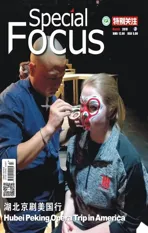Speaking English abroad
2018-04-10ByChenJing
By Chen Jing

It is well known that English is the most widely used second language in the world. However, when traveling in a country where English is not the mother tongue, English may not be quite an easy thing. This was what I experienced in Russia,Cambodia, and Thailand.
The local tour guide told me that the Russians were not good at speaking English. I decided I would try to prove them wrong.I went to an underground mall in St. Petersburg to buy a doll with traditional Russian clothes. The boss, a lady in her 40s, told me about the details of the doll in Russian. I could guess her meaning roughly through her exaggerated body language. However, when I asked her a question in English,her expression appeared helpless. Then she left me alone.Fortunately, a 20-year-old college student volunteered to be our translator. At last, I bought my favorite doll. Later, he told me that he had learned English in school. He told me the elder generation did not have a chance to study it as he did. Moreover,most of them were not interested in learning English in their spare time.
In Angkor Wat, Kampuchea,you could see the kids begging for candies or cents in the scenic spots. To get these donations,they could only speak simple English words (eg. one dollar,candy, thanks)—but they could speak those words quite well. The tourists could meet their demands on that condition. However, while I tried to communicate with them in English, they quickly ran away.They would find another group of tourists and repeat their requests in the same way.
The experience of speaking English in Thailand was the most interesting. In Chiang Mai, a province of Thailand, speaking English to the locals was almost impossible. No matter how slow I spoke, and how exaggerated I behaved, the local people just shook their heads. My best friend who has been to Chiang Mai told me that Chinese was more popular than English here.Therefore, we spoke Chinese as we did at home. Between speaking Chinese and using Alipay, we practically felt like we were traveling in China.◆
英语是世界上最广泛使用的第二语言。当我在英语非母语的国家旅行时,有时却会为是否说英语的事情而犯愁。
当地的导游告诉我,俄罗斯人并不热衷说英语。果真如此吗?旅行途中,我决定验证一下。在圣彼得堡的一家地下商场,我看中一个身着俄罗斯传统服饰的布偶。店长是一名40岁左右的女士。她非常热情地用俄罗斯语向我介绍这个布偶的特点,告诉我布偶的功能。通过她夸张的肢体语言,我大致能猜出一二。而当我用英语具体询问时,她的表情瞬间流露出无奈,转身就去做其他的事情。幸好,店里有名20多岁的大学生,做起了我们之间的翻译,我才最终买到心仪的布偶。后来,这名大学生告诉我,他们这代人是在学校学习这门语言。年纪略长的一代,没有机会在学校学习英语,而他们大多也没兴趣进行自学。
在柬埔寨的吴哥窟,每个景点附近都有索要糖果或纸币的小孩。为了能获得一些糖果,或者1美元,他们也把诸如“1美元”“糖果”“谢谢”等基本英语单词说得很地道。看着那无辜的小眼神,谁也无法拒绝这小小的请求。可是,当我打算和他们用英语多交流时,他们就撒欢地跑了。转眼,他们又用同样的方式站到不远处其他游人的面前。

泰国说英语的经历最是让我难忘。在清迈,不管是在大商场,还是路边的小摊,说英语几乎成了奢望。不管用多么慢速,多么夸张地表达,当地人基本都是摇摇头。和我同行的闺蜜,来过清迈。她说,这里的汉语比英语更加流行。后来,我们就和在国内一样,汉语走遍天下。随处可见的支付宝,更是感觉和在国内旅行没什么两样。◆
